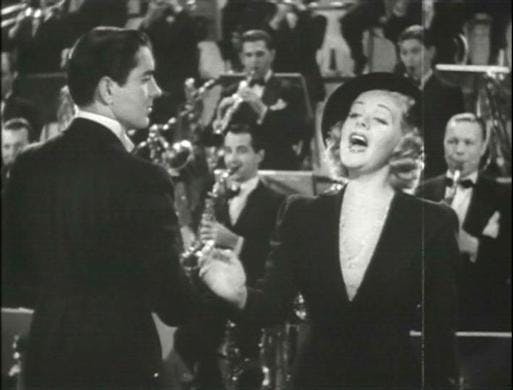New CD Series Offers Vivid Snapshot of Early Pop Music, by Way of the Movies
You can’t help but conclude that these vintage soundtrack performances are some of the most powerful historical recordings ever made.

Al Jolson singing “Oh! Susanna” on the soundtrack of the 1939 movie musical “Swanee River” is 97 seconds of sheer bliss. The legendary entertainer performed this vintage Stephen Foster song on many occasions, but this version is special.
Jolson is even more full of vitality and energy than usual, and he doubles up on his signature special vocal effects — he growls, he purrs; you can’t miss the smirk on his face. He sticks to the strict 2/4 tempo, but even so he finds ways to play with the time, delaying a note here, stretching it out there, rushing it somewhere else. What’s more, he’s perfectly supported by the orchestra of Louis Silver, and his magnificent baritone is captured in genuine high-fi audio quality.
I’ve seen “Swanee River” many times — it’s a typical costume picture that’s a highly fictionalized biopic of the pioneering Civil War-era songwriter Stephen Foster. Watching the movie, somehow I never noticed how powerful this performance happens to be. On screen, Jolson is in an outlandish minstrel show get-up, as is the banjo-centric orchestra around him, and the visuals tend to distract from the actual performance.
You can’t help but conclude that these vintage soundtrack performances — when we are fortunate enough to hear them without the encumbrances of the actual movies, the dialog, sound effects, and what have you, not to mention the edits imposed on them for the sake of the narrative — are some of the most powerful historical recordings ever made. In many cases, they’re much more so than comparable commercial recordings, made for release on 78 RPM discs of the period, or even surviving live radio airchecks.
“Oh! Susanna” is one of about 350 tracks restored and issued in a set of six double-CD packages produced by a historian and archivist, Bryan Cooper, for the British firm Sepia Records. For this hopefully ongoing series, Mr. Cooper has chosen to focus on the movie musicals — as well as occasional numbers from comedies and dramas — produced by 20th Century Fox. As he notes, at the peak of the Hollywood studio system, each of the big corporations had their own house style: MGM was the home of envelope-pushing innovations in musical storytelling, while Warner Bros. musicals tended to be highly snappy and contemporary.
Fox was more conservative, plot-wise at least, offering mostly light period romantic comedies centered on parading their major leading ladies, Alice Faye and Betty Grable, in elaborate turn-of-the-century finery. Yet as these 12 CDs show, its music department was second to none.
As Mr. Cooper explains in the notes to the first volume of the Alice Faye series, the material was preserved via “playback discs.” The performances were pre-recorded and privately pressed on 78 RPM discs mainly so the stars could practice lip-synching or sidelining to the tracks when the cameras were actually rolling. Mr. Cooper has painstakingly assembled enough of these very rare items to put together this comprehensive project.
This is a vivid snapshot of pop music spanning the years from the depths of the Depression to the war and early postwar years, and all sorts of characters show up here, starting with the blonde bombshell headliners, Faye and Grable, along with such distinguished leading men as Tony Martin, Don Ameche, and Dick Haymes. There are song-and-dance men like George Murphy, Jack Haley, Dan Dailey, and Buddy Ebsen, and masterful musical funnymen like Bert Lahr and the Ritz Brothers.
These were also the great years of the big bands, and there are vivid, brilliantly recorded, and very excited samples of Cab Calloway (playing a wild and extended instrumental of the King Cole Trio’s “Pitchin’ Up a Boogie”), Harry James, and Woody Herman; even the Fox studio orchestra itself sounds remarkable.
The majority of Fox’s great wartime scores were by Harry Warren, truly the king of the Hollywood musical (among other gems, there’s the premiere of “There Will Never Be Another You”), but there are guest appearances, as it were, by Irving Berlin and the Gershwin Brothers.
There are surprises galore, like a number by Barbara Stanwyck and Basil Rathbone as Sherlock Holmes singing an old English music hall song, and cameo appearances by Judy Garland and Ethel Merman. I was particularly happy to find a number of African-American performers, such as the larger-than-life Peters Sisters, Bill “Bojangles” Robinson, and a name that was new to me, the operatic tenor Charles Holland.
The latter gets one number in “Youth Will Be Served,” a 1939 B-comedy starring Jane Withers, a juvenile star whom Fox briefly promoted as a successor to Shirley Temple. Holland’s opus, “Hot Catfish And Corn Dodgers,” is by Louis Alter, who, like George Gershwin, wrote both show tunes and formal concert music, and this number sounds, more than anything, like an outtake from “Porgy and Bess.” Who knew?

